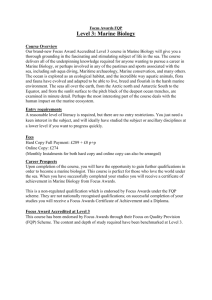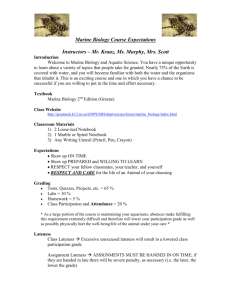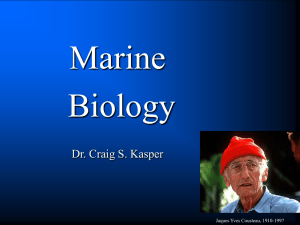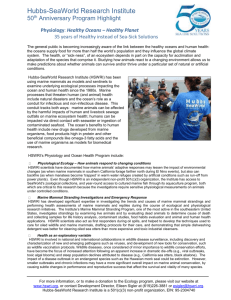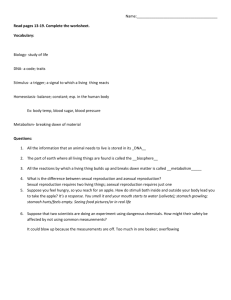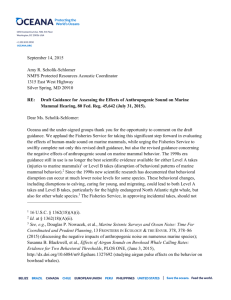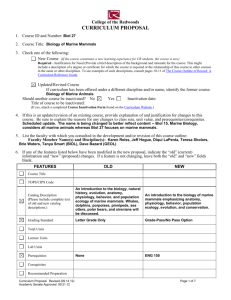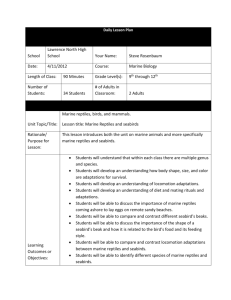Syllabus BIO 296 (3 credits) Marine Mammal Biology CE Study
advertisement
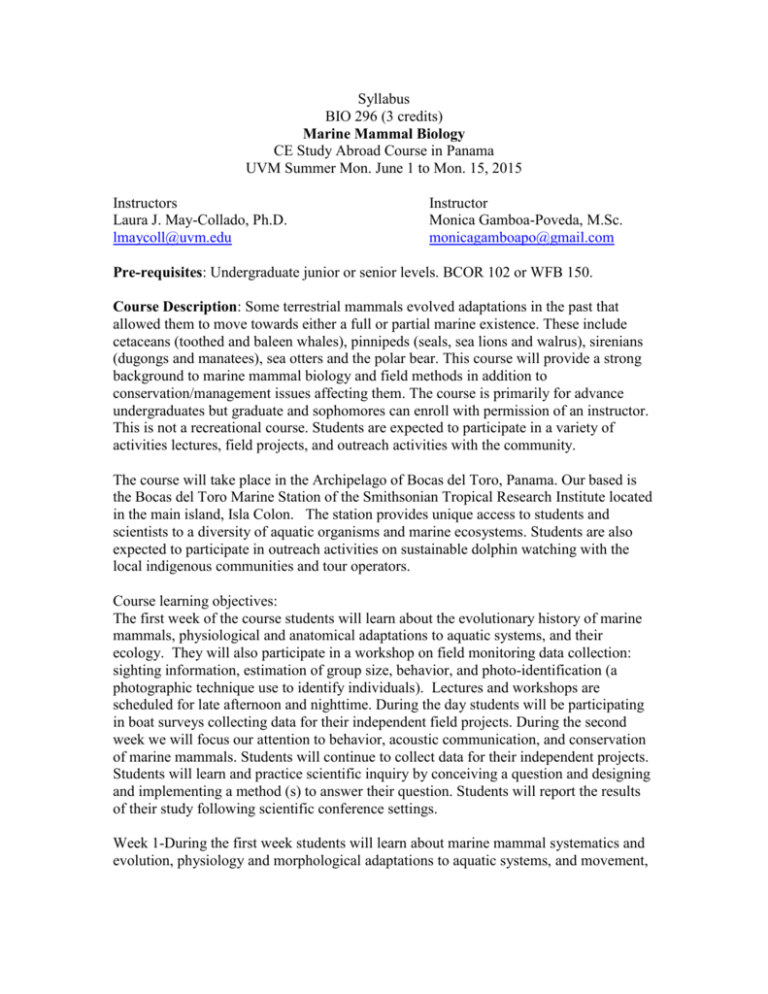
Syllabus BIO 296 (3 credits) Marine Mammal Biology CE Study Abroad Course in Panama UVM Summer Mon. June 1 to Mon. 15, 2015 Instructors Laura J. May-Collado, Ph.D. lmaycoll@uvm.edu Instructor Monica Gamboa-Poveda, M.Sc. monicagamboapo@gmail.com Pre-requisites: Undergraduate junior or senior levels. BCOR 102 or WFB 150. Course Description: Some terrestrial mammals evolved adaptations in the past that allowed them to move towards either a full or partial marine existence. These include cetaceans (toothed and baleen whales), pinnipeds (seals, sea lions and walrus), sirenians (dugongs and manatees), sea otters and the polar bear. This course will provide a strong background to marine mammal biology and field methods in addition to conservation/management issues affecting them. The course is primarily for advance undergraduates but graduate and sophomores can enroll with permission of an instructor. This is not a recreational course. Students are expected to participate in a variety of activities lectures, field projects, and outreach activities with the community. The course will take place in the Archipelago of Bocas del Toro, Panama. Our based is the Bocas del Toro Marine Station of the Smithsonian Tropical Research Institute located in the main island, Isla Colon. The station provides unique access to students and scientists to a diversity of aquatic organisms and marine ecosystems. Students are also expected to participate in outreach activities on sustainable dolphin watching with the local indigenous communities and tour operators. Course learning objectives: The first week of the course students will learn about the evolutionary history of marine mammals, physiological and anatomical adaptations to aquatic systems, and their ecology. They will also participate in a workshop on field monitoring data collection: sighting information, estimation of group size, behavior, and photo-identification (a photographic technique use to identify individuals). Lectures and workshops are scheduled for late afternoon and nighttime. During the day students will be participating in boat surveys collecting data for their independent field projects. During the second week we will focus our attention to behavior, acoustic communication, and conservation of marine mammals. Students will continue to collect data for their independent projects. Students will learn and practice scientific inquiry by conceiving a question and designing and implementing a method (s) to answer their question. Students will report the results of their study following scientific conference settings. Week 1-During the first week students will learn about marine mammal systematics and evolution, physiology and morphological adaptations to aquatic systems, and movement, migration, and habitat use. In addition, they will be introduced to field data collection and initiate their independent group projects. Week 2-During this second week students will lean about marine mammal behavior, specifically foraging adaptations, prey-predator interactions, acoustic communication and social behavior, life history, and population genetics. They will continue with their independent field project, which will culminate oral presentation of their results. Course Itinerary: Date Wed. June 1 Thu. June 2 Morning Travel individually to Bocas del Toro Introduction: The Bocas Dolphin Project. Lecture 1: Systematics and evolution Afternoon Workshop on field methods and preparation of field equipment Night Dinner and Orientation Lecture 3: Movement, Migration, and Habitat Use Data Entry Assignment of independent group projects Lecture 2: structure and locomotion, thermoregulation and osmorregulation Fri. June 3 Boat-Surveys Boat-Surveys Sat. June 4 Boat-Surveys Boat-Surveys Sun. June 5 Boat-Surveys MidTerm due @ 5 p.m. Mon. June 6 Boat-Surveys Boat-Surveys Tue. June 7 Boat-Surveys Boat-Surveys Lecture 4: Diet and Foraging adaptations, diving physiology Data Entry Lecture 5: Sensory systems Data Entry Lecture 6: Sound production and communication Data Entry Lecture 7: Reproduction, life history, and mating systems Lecture 8: Social behavior Wed. June 8 Boat-Surveys Boat-Surveys Thu. June 9 Boat-Surveys Boat-Surveys Fri. June 10 Boat-Surveys Boat-Surveys Sat. June 11 Boat-Surveys Boat-Surveys Sun. June 12 Boat-Surveys Boat-Surveys Mon. June 13 Work on Oral and written papers Final Exam due @ 1p.m. Back home Work on Oral and written papers Packing up Tue. June 14 Wed. June 15 Lecture 9: Population biology and genetics Data analysis meet with instructors Lecture 10: Threats and Conservation Data analysis meet with instructors Workshop: Statistical analysis (bring your data) Data analysis meet with instructors Data analysis meet with instructors Presentations Farewell dinner Grading Midterm exam: 25% Final exam: 25% Independent Field Project: (25% field work, 10% oral, 15% written paper). Student Behavior: Students are expected to comply with UVM Code of Academic Integrity and the rules of Smithsonian Tropical Research Institute. Students are required to participate in all course activities. No drug or alcohol is allowed in this course. Recommended Books: Reynolds J. E. and Rommel, S. A. 2013. Biology of Marine Mammals. Smithsonian Press. (available in kindle). Instructors Bios: Laura J. May-Collado: Native of Costa Rica. She has over 16 years of experience working with vertebrates including bats, birds, fish, and marine mammals. She earned her master’s degree at University of Costa Rica and her Ph.D. at Florida International University. She is currently a Research Associate at the University of Vermont in the Department of Biology, and has coordinated Field Biology courses for OTS in the past. Monica Gamboa-Poveda: She is American/Costa Rican that has work with dolphins, sea turtles, and marine invertebrates for over 10 years. She earned her master’s degree at Universidad Nacional of Costa Rica. She is currently an associated research to Panacetacea.org and organization dedicated to the study and conservation of marine mammals in Panama.



